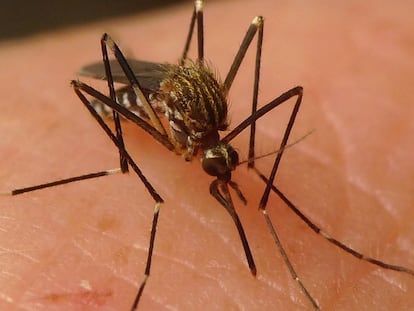Meningoencephalitis outbreak sparks fear in Andalusia: ‘This is like the plagues of Egypt’
A total of 17 people have been hospitalized with the condition in Seville, which is already struggling from the impact of the coronavirus crisis

The West Nile virus, which is transmitted via mosquito bites, has led to an outbreak of viral meningoencephalitis in Seville, in Spain’s southern Andalusia region. A total of 19 people have caught the infection, which is a condition that simultaneously resembles meningitis and encephalitis. Of this number, 17 have been admitted into hospital and seven into intensive care. There are no vaccines or drugs to treat the hospitalized patients.
The source of the outbreak was initially unknown, but lab tests done on 12 patients in Coria del Río and La Puebla del Río, two municipalities on the Guadalquivir River where mosquitoes are common, have shown the cause to be the West Nile virus, the Andalusian regional government confirmed on Thursday.
In the supermarket, two women were fighting for mosquito repellentCarmen Salcedo, local of Coria de Río
In response to the outbreak, the Andalusian health department has recommended that the 42,000 residents of the areas in question take measures to avoid mosquitoes, such as the use of repellents and nets, and has activated a special protocol, which includes fumigations. “We will have preventive measures to fight against mosquitoes, as well as measures to eliminate them as quickly as possible,” said regional health chief Jesús Aguirre.
The situation has raised fear in the affected communities, which are already struggling from the impact of the coronavirus crisis.
“This is like the seven plagues of Egypt. Everything was already dead with Covid-19 and now this comes up,” said the owner of a restaurant in Coria del Río, who wished to remain anonymous. “We mustn’t frighten people, that would kill business.”
While the Biblical reference may seem excessive, the area has seen a surprising list of calamities. Last year, Seville was the site of the largest listeria outbreak in Spain’s history, with 222 cases, three deaths and seven miscarriages. In January, residents of Coria del Río discovered that the municipal sewage system was releasing toxic gasses that were harmful to human health. In mid-March, the area – like the rest of Spain – was placed under a strict lockdown in a bid to curb the spread of Covid-19, and now the West Nile virus is threatening to destroy the local economy just as it was starting to recover from the confinement measures.
“In the supermarket, two women were fighting for mosquito repellent, until a store worker told one of them that she could only take two, so she let go of the other four she was carrying. They instill fear in you, and people don’t know about the [West Nile] virus,” said Carmen Salcedo, a local from Coria de Río, on Thursday.
But not everyone is being as cautious. On Thursday night, most of the locals were in short-sleeves – even though the Andalusian health department has advised residents to cover their skin with clothing to avoid mosquito bites.
Estrella Plata was walking by the Guadalquivir River in a top and sport shorts: “I have not used repellent, so touch wood, because mosquitoes come out at night.”
Another local, José Antonio García, added: “I’m cautious. I care, but you have to die of something.”
The West Nile virus, which is transmitted by the Culex mosquito common to the area, kills 0.1% of patients, while another 1% suffer meningoencephalitis (inflammation of the brain and its surrounding membranes), 20% develop a controllable fever and 80% are asymptomatic, according to the World Health Organization (WHO).
This summer the two municipal pools in the affected areas will remain closed, leaving residents to cool off as best as possible, mostly in children’s inflatable swimming pools.
“Two months in long sleeves is the least of it,” said Modesto González, the mayor of Coria del Río. “We hope there are no more infections and that the patients can leave the hospital as soon as possible.”
Controlling the spread
Health experts say it is difficult to control the spread of the West Nile virus. “It is very complicated because the most important vector is the common mosquito. The handful of people who have been infected in Seville means that there are many more cases, around 2,000,” estimated Joan Ramon Villalbí, a board member of the Spanish Association of Public Health and Health Administration (Sespas), who added that the virus cannot be transmitted from human to human.
Villalbí is opposed to the use of “aggressive chemicals,” but Jordi Figuerola, a researcher at the Doñana national park biology center, says fumigation may be the only solution, as summer is already underway and mosquito numbers are 30% higher than recorded in 2019.
“Ideally we would kill [the mosquito] larvae, but given what we have, we have to try to cut transmission. Fumigating is not a panacea but it has an effect,” he explained.
As for the source of the outbreak, Figuerola blames heavy springtime rain and the coronavirus lockdown: “People weren’t out in the country, which meant that water accumulated in uncovered deposits and containers, and these turned into mosquito breeding grounds.”
English version by Melissa Kitson.








































